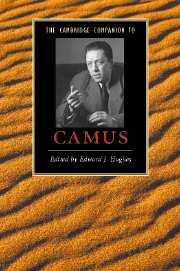Book contents
- Frontmatter
- Introduction
- PART I: BIOGRAPHY AND INFLUENCES
- PART II: THEMES, PREOCCUPATIONS AND GENRES
- PART III: TEXTS AND CONTEXTS
- 11 From Noces to L’Etranger
- 12 Layers of meaning in La Peste
- 13 Withheld identity in La Chute
- 14 Le Premier Homme and the literature of loss
- Postface
- Guide to Further reading
- Index
- Series List
11 - From Noces to L’Etranger
from PART III: - TEXTS AND CONTEXTS
Published online by Cambridge University Press: 28 September 2007
- Frontmatter
- Introduction
- PART I: BIOGRAPHY AND INFLUENCES
- PART II: THEMES, PREOCCUPATIONS AND GENRES
- PART III: TEXTS AND CONTEXTS
- 11 From Noces to L’Etranger
- 12 Layers of meaning in La Peste
- 13 Withheld identity in La Chute
- 14 Le Premier Homme and the literature of loss
- Postface
- Guide to Further reading
- Index
- Series List
Summary
In February 1937 twenty-four-year old Albert Camus delivered the opening address at the launch of a new Maison de la Culture in Algiers. He placed the undertaking squarely within the cultural debate going on in an Algiers dominated by a group of well-established European artists and intellectuals known as the 'Algerianists', supporters (under the leadership of the novelists Louis Bertrand and Robert Randau) of the reactionary politics of Maurice Barrès and Charles Maurras in mainland France. As Camus's title made clear, for the young people launching this new venture - a group of selfstyled 'left-wing intellectuals' (Ess, 1321) united through university, amateur theatre, political activism - the issue of the day was 'La culture indigène. La nouvelle culture méditerranéenne' ('Indigenous Culture. The New Mediterranean Culture'). To today's (postcolonial) reader, this title might suggest an anthropological assessment of a colonised culture and its absorption into, and contribution to, a new, perhaps hybridised, cultural construct. The stated objective, announced with a high seriousness scarcely veiled by a declared modesty, would seem to reinforce this perception: 'servir la culture méditerranéenne, contribuer à l'édification, dans le cadre régional, d'une culture dont l'existence et la grandeur ne sont plus à démontrer. Nous voulons seulement aider un pays àséxprimer lui-même. Localement. Sans plus. La vraie question: une nouvelle culture méditerranéenne est-elle réalisable?' ('to serve Mediterranean culture, to contribute, within a regional framework, to the construction of a culture whose existence and grandeur are widely recognised. We simply wish to help a country express itself.
- Type
- Chapter
- Information
- The Cambridge Companion to Camus , pp. 147 - 164Publisher: Cambridge University PressPrint publication year: 2007
- 3
- Cited by

